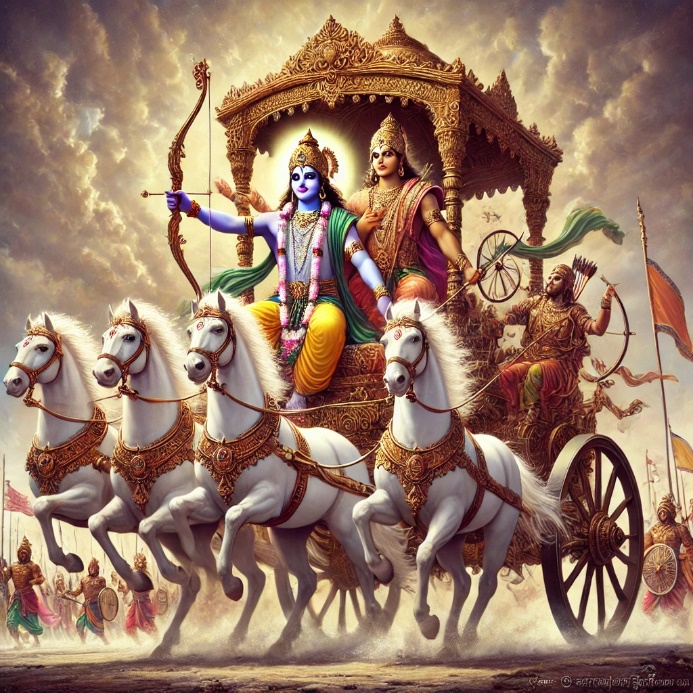The Crisis of Purpose: Overcoming Doubt, Fear, and Emotional Paralysis in Life's Battles
The great war of Kurukshetra is about to begin between the Pandavas and the Kauravas. King Dhritarashtra, blind and unable to witness the battle, asks Sanjaya, his charioteer and divine seer, to narrate what is happening on the battlefield.
As both armies stand ready, the mighty warrior Arjuna requests his charioteer, Lord Krishna, to place his chariot between the two armies. As he looks at the opposing side, he sees his own relatives, teachers, and loved ones – Bhishma, Dronacharya, Kripacharya, cousins, and friends. Overwhelmed by grief and compassion, Arjuna's heart fills with sorrow.
He starts questioning the purpose of war, feeling that killing his own family or relatives—even for a righteous cause—would lead to sin and the destruction of family values (Dharma).

Shaken by emotions, Arjuna loses his will to fight. His hands tremble, his mind becomes confused, and his body weakens. He sees only sorrow and destruction in war and refuses to take up arms. In despair, he throws down his Gandiva bow and sits in his chariot, surrendering to Krishna.
This chapter, 1, is called Arjuna Vishada Yoga – the Yoga of Arjuna’s Despondency, where his inner turmoil makes him question the purpose of the war. The following Shloka captures the essence of Chapter 1 of the Bhagavad Gita:
न काङ्क्षे विजयं कृष्ण न च राज्यं सुखानि च |
किं नो राज्येन गोविन्द किं भोगैर्जीवितेन वा ||
Transliteration:
na kāṅkṣe vijayaṁ kṛṣṇa na ca rājyaṁ sukhāni cha
kiṁ no rājyena govinda kiṁ bhogairjīvitena vā
Meaning:
"O Krishna, I do not desire victory, kingdom, or pleasures. What use is a kingdom, enjoyment, or even life itself when those for whom we seek them stand before us ready to battle?"
Shloka-wise Summary of Chapter 1:
Shlokas 1-11: The Battlefield and Army Arrangements
- (1.1) Dhritarashtra asks Sanjaya about the events at Kurukshetra.
- (1.2-1.11) Duryodhana approaches Dronacharya, boasting about his vast army and its mighty warriors. Bhishma, the Kaurava commander, blows his conch, signalling war.
Shlokas 12-20: The Pandavas' Response
- (1.12-1.14) Bhishma roars like a lion and blows his conch. The Pandavas, led by Krishna and Arjuna, respond with their divine conches.
- (1.15-1.20) Conches of Yudhishthira, Bhima, Nakula, Sahadeva, and others resound, filling the battlefield with courage.
Shlokas 21-30: Arjuna’s Moral Dilemma
- (1.21-1.23) Arjuna asks Krishna to place his chariot in the middle of the battlefield.
- (1.24-1.25) Krishna places it before Bhishma and Drona.
- (1.26-1.30) Arjuna sees his loved ones on both sides and is overcome with sorrow and despair.
Shlokas 31-47: Arjuna Refuses to Fight
- (1.31-1.35) Arjuna fears the consequences of war and its destruction.
- (1.36-1.40) He worries about the downfall of family values and dharma.
- (1.41-1.45) He believes war will lead to sin, chaos, and destruction of righteousness.
- (1.46-1.47) Overcome by emotions, Arjuna drops his bow and sits down, unwilling to fight.
The Battlefield of Kurukshetra & The Battlefield of Life

Thousands of years ago, Arjuna stood at the edge of battle, facing a war he never wished for. His heart was heavy, his mind clouded with doubt, and his hands trembled as he saw his own family, friends, and teachers on the opposing side.
The mighty warrior, known for his bravery, suddenly found himself paralyzed—not by fear of death, but by the fear of making the wrong decision. Should he fight for righteousness, or should he walk away to avoid bloodshed and grief?
This moment of moral crisis, where Arjuna dropped his bow in despair, is not just a story from the Bhagavad Gita—it reflects the battles each one of us fights in daily life.
In today’s world, our Kurukshetra is not a physical battlefield, but the challenges we face—tough career choices, family responsibilities, societal expectations, personal failures, and ethical dilemmas. Like Arjuna, we often stand at crossroads, torn between duty and emotions, unsure of the right path.
We feel helpless, anxious, and lost in the chaos of life’s uncertainties. The Gita’s wisdom is timeless, reminding us that confusion is natural, but we must seek clarity and inner strength. Just as Krishna guided Arjuna, we, too, must turn inward—to wisdom, self-discipline, and faith.
The first step to overcoming struggles is not running away, but facing them with courage, knowledge, and a higher purpose. Life’s battles are not meant to weaken us but to help us discover our true strength.